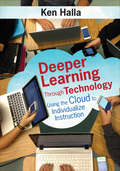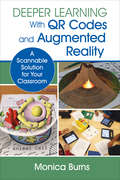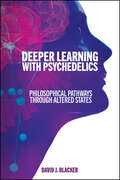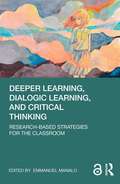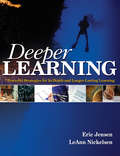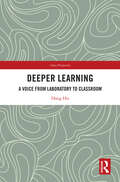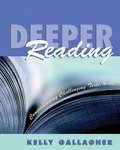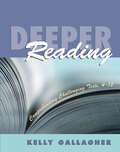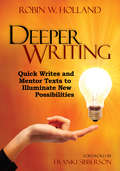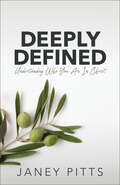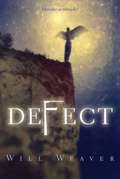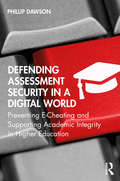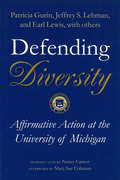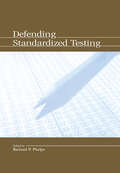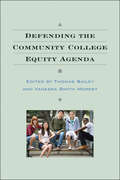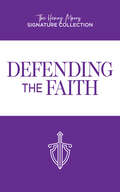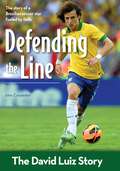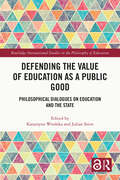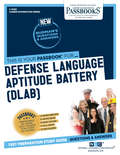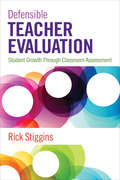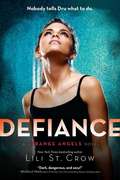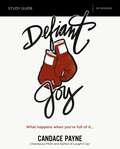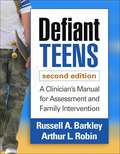- Table View
- List View
Deeper Learning Through Technology: Using the Cloud to Individualize Instruction
by Kenneth P. HallaUse the Cloud to Individualize Your Instruction and Watch Your Students Thrive! The advent of cloud-stored data that can be entered, changed, and accessed anywhere is a development full of potential for today’s classroom. This book is the all-in-one resource you need to be sure your students reap the fullest rewards from cloud-based developments. Teacher and top ed-blogger Ken Halla explains: Strategies for leveraging the cloud to create a self-paced, learner-centered classroom How to take advantage of tech tools to facilitate learning Real-life case studies and activities to ensure an enjoyable implementation experience. Stay ahead of the curve with Ken Halla’s strategies, which you can implement the next morning. "Halla′s book, written from practitioner experience, provides practical and simple integration techniques that will assist both novice and experienced teachers incorporate technology to enhance student learning." —Eric Sheninger, author of Digital Leadership, Changing Paradigms for Changing Times "This is a must read--a detailed nuts and bolts guide to classroom tools in the cloud." —Michael B. Horn, Co-Founder and Director, Christensen Institute Author of Disrupting Class: How Disruptive Innovation Will Change the Way the World Learns. "Whether you are an ed tech veteran or just getting started, Halla′s book will help you tailor learning to meet the needs of your students. This book will help you create the learner-focused classroom you want to build! A must-have resource for today′s teachers!" —Jaime Casap, Global Education Evangelist Google
Deeper Learning Through Technology: Using the Cloud to Individualize Instruction
by Kenneth P. HallaUse the Cloud to Individualize Your Instruction and Watch Your Students Thrive! The advent of cloud-stored data that can be entered, changed, and accessed anywhere is a development full of potential for today’s classroom. This book is the all-in-one resource you need to be sure your students reap the fullest rewards from cloud-based developments. Teacher and top ed-blogger Ken Halla explains: Strategies for leveraging the cloud to create a self-paced, learner-centered classroom How to take advantage of tech tools to facilitate learning Real-life case studies and activities to ensure an enjoyable implementation experience. Stay ahead of the curve with Ken Halla’s strategies, which you can implement the next morning. "Halla′s book, written from practitioner experience, provides practical and simple integration techniques that will assist both novice and experienced teachers incorporate technology to enhance student learning." —Eric Sheninger, author of Digital Leadership, Changing Paradigms for Changing Times "This is a must read--a detailed nuts and bolts guide to classroom tools in the cloud." —Michael B. Horn, Co-Founder and Director, Christensen Institute Author of Disrupting Class: How Disruptive Innovation Will Change the Way the World Learns. "Whether you are an ed tech veteran or just getting started, Halla′s book will help you tailor learning to meet the needs of your students. This book will help you create the learner-focused classroom you want to build! A must-have resource for today′s teachers!" —Jaime Casap, Global Education Evangelist Google
Deeper Learning With QR Codes and Augmented Reality: A Scannable Solution for Your Classroom (Corwin Teaching Essentials)
by Monica BurnsEngaging, interactive learning—right in your students’ hands! What if your students’ mobile devices became an instructional asset rather than a distraction? Discover how free, scannable technology can enrich learning, while captivating students. Best of all, these technologies are easy to quickly implement within your classroom. Learn about QR codes and Augmented Reality (AR) Reach each student with new, hands-on learning opportunities Embrace the ACES Framework for teaching with scannable technologies: Access, Curate, Engage, and Share Promote self-directed learning and showcase students’ creations Leverage technology to connect classroom activities with students’ families and the broader community
Deeper Learning With QR Codes and Augmented Reality: A Scannable Solution for Your Classroom (Corwin Teaching Essentials)
by Monica BurnsEngaging, interactive learning—right in your students’ hands! What if your students’ mobile devices became an instructional asset rather than a distraction? Discover how free, scannable technology can enrich learning, while captivating students. Best of all, these technologies are easy to quickly implement within your classroom. Learn about QR codes and Augmented Reality (AR) Reach each student with new, hands-on learning opportunities Embrace the ACES Framework for teaching with scannable technologies: Access, Curate, Engage, and Share Promote self-directed learning and showcase students’ creations Leverage technology to connect classroom activities with students’ families and the broader community
Deeper Learning with Psychedelics: Philosophical Pathways through Altered States (SUNY series, Horizons in the Philosophy of Education)
by David J. BlackerIn both clinical and informal settings, psychedelics users often report they have undergone something profound and even life-altering. Yet there persists a confounding inability to articulate just what has been imparted. Informed by multidisciplinary emerging research, this book provides an account of the specifically educational aspects of psychedelics and how they can render us ready to learn. Drawing from indigenous peoples worldwide who typically revere these substances as "plant teachers" and from canonical thinkers in the western tradition such as Plato, Spinoza, Kant, and Heidegger, the author proposes an original set of categories through which to understand the educational capabilities of "entheogens" (psychedelics with visionary qualities). It emerges that entheogens' real power lies not in destabilizing and decentering—"turning on and dropping out"—but as powerful aids in restoring and reenchanting our shared worlds.
Deeper Learning, Dialogic Learning, and Critical Thinking: Research-based Strategies for the Classroom
by Emmanuel ManaloDeeper learning, dialogic learning, and critical thinking are essential capabilities in the 21st-century environments we now operate. Apart from being important in themselves, they are also crucial in enabling the acquisition of many other 21st-century skills/capabilities such as problem solving, collaborative learning, innovation, information and media literacy, and so on. However, the majority of teachers in schools and instructors in higher education are inadequately prepared for the task of promoting deeper learning, dialogic learning, and critical thinking in their students. This is despite the fact that there are educational researchers who are developing and evaluating strategies for such promotion. The problem is bridging the gap between the educational researchers’ work and what gets conveyed to teachers and instructors as evidence-based, usable strategies. This book addresses that gap: in it, leading scholars from around the world describe strategies they have developed for successfully cultivating students’ capabilities for deeper learning and transfer of what they learn, dialogic learning and effective communication, and critical thought. They explore connections in the promotion of these capabilities, and they provide, in accessible form, research evidence demonstrating the efficacy of the strategies. They also discuss answers to the questions of how and why the strategies work. A seminal resource, this book creates tangible links between innovative educational research and classroom teaching practices to address the all-important question of how we can realize our ideals for education in the 21st century. It is a must read for pre-service and in-service teachers, teacher educators and professional developers, and educational researchers who truly care that we deliver education that will prepare and serve students for life.
Deeper Learning: 7 Powerful Strategies for In-Depth and Longer-Lasting Learning
by Eric P. Jensen Leann NickelsenPractical strategies to take your students' understanding from "So what?" to "Wow!" Based on current brain research and information about differentiated learning, this book for Grades 4–12 outlines the Deeper Learning Cycle (DELC), a teaching model that applies learning and content processing techniques to everyday instruction. This resource features: Chapters explaining the cycle's seven stages, including standards and curriculum, building a positive learning culture, acquiring new knowledge, processing learning, and evaluating student learning A lesson plan template to apply to daily instruction Strategies to help students process content in meaningful ways Reflection questions to help teachers apply the material to their own practice
Deeper Learning: A Voice from Laboratory to Classroom (China Perspectives)
by Hang HuIntegrating brain science, cognitive psychology, education and information technology, the books studies how technology promoted deeper learning on mathematics in Chinese primary schools. After introducing the theoretical basis, connotation and mechanism of deeper learning, the author fully explains its practice, including the composition of deeper learning teaching content, the development of digital resources, classroom teaching technology and teachers' professional development of deeper learning. He especially adopts multiple and interdisciplinary research methods, such as deeper learning "triangle evidence" paradigm, learning brain observation, education big data analysis, artificial intelligence education analysis, education action, qualitative and quantitative research. On one hand, the book will give researchers of learning theory and pedagogy an in-depth understanding of what deeper learning is and why it provides a systematic theoretical system; on the other hand, it will also provide school practitioners with operational methods and cases to learn from.
Deeper Reading: Comprehending Challenging Texts, 4-12
by Kelly GallagherBuilding on twenty years of teaching language arts, the author shows how students can be taught to successfully read a broad range of challenging and difficult texts with deeper levels of comprehension. In this book, the author shares effective, classroom-tested strategies that enable your students to: accept the challenge of reading difficult books; move beyond a "first draft" understanding of the text into deeper levels of reading; consciously monitor their comprehension as they read; employ effective fix-it strategies when their comprehension begins to falter; use meaningful collaboration to achieve deeper understanding of texts; think metaphorically to deepen their reading comprehension; reach deeper levels of reflection by understanding the relevance the book holds for themselves and their peers; use critical thinking skills to analyze real-world issues. The author also provides guidance on effective lesson planning that incorporates strategies for deeper reading.
Deeper Reading: Comprehending Challenging Texts, 4-12
by Kelly GallagherDo your students often struggle with difficult novels and other challenging texts? Do you feel that you are doing more work teaching the novel than they are reading it? Building on twenty years of teaching language arts, Kelly Gallagher shows how students can be taught to successfully read a broad range of challenging and difficult texts with deeper levels of comprehension. In Deeper Reading: Comprehending Challenging Texts, 4-12 , he shares effective, classroom-tested strategies that enable your students to: Accept the challenge of reading difficult books and move beyond a "first draft" understanding Consciously monitor their comprehension as they read and employ effective "fix-it" strategies when comprehension starts to falter Use meaningful collaboration and metaphorical thinking to achieve deeper understanding of texts Reflect on the relevance the book holds for themselves and their peers by using critical thinking skills to analyze real-world issues Gallagher also provides guidance on effective lesson planning that incorporates strategies for deeper reading. Funny, poignant, and packed with practical ideas that work in real classrooms, Deeper Reading is a valuable resource for any teacher whose students need new tools to uncover the riches found in complex texts.
Deeper Writing: Quick Writes and Mentor Texts to Illuminate New Possibilities
by Robin W. HollandYour best tool for building fluent writers Make your classroom's writing time really count, with smart and compelling texts designed to enhance the instruction you're already providing. Whether you teach 4th grade, 12th, or anything in between, you'll foster authentic writing every day, building fluency and teaching students to write for a variety of purposes—top priorities in the Common Core. Look for: 45 quick writes in an easy-to-use framework with suggested grade levels Carefully selected mentor texts that provide models and inspiration Guidelines for crafting your own quick writes, tailored to your students’ needs
Deeply Defined: Understanding Who You Are In Christ
by Janey PittsDeeply Defined uses biblical culture and the original languages to explain common “church words” Christians use every day but have a hard time explaining when asked. Deeply Defined helps readers become deeply defined by God’s word on a personal level as they begin to understand how to apply biblical concepts in their lives. Janey Pitts takes readers on a journey of discovery. She begins by exploring holiness, then defines areas that need to be worked through, like sin, repentance, and forgiveness. The bulk of Deeply Defined however swims in the concepts of grace, peace, joy, hope, and wisdom. Readers will finish Deeply Defined having a better understanding not only of the Bible, but of who they are in Christ.
Defect
by Will WeaverMaybe it was bad karma. Maybe it was just bad luck. Whatever the reason, fifteen-year-old David was born defective. His bug eyes, pinched face, and hearing aids are obvious, but there is a secret David keeps from everyone, even his foster parents. Because of a thin layer of skin hidden under each arm, David can fly--well, glide is more like it. Terrified of doctors, wary of letting down his guard, David is determined to hide his secret at any cost. But then David meets Cheetah, a girl whose own defect doesn't diminish her spirit, and suddenly his life begins to take wing.In this arresting new novel, Will Weaver creates an unforgettable character on the path to discovering that some blessings can be a curse--and some curses a blessing.
Defending Assessment Security in a Digital World: Preventing E-Cheating and Supporting Academic Integrity in Higher Education
by Phillip DawsonDefending Assessment Security in a Digital World explores the phenomenon of e-cheating and identifies ways to bolster assessment to ensure that it is secured against threats posed by technology. Taking a multi-disciplinary approach, the book develops the concept of assessment security through research from cybersecurity, game studies, artificial intelligence and surveillance studies. Throughout, there is a rigorous examination of the ways people cheat in different contexts, and the effectiveness of different approaches at stopping cheating. This evidence informs the development of standards and metrics for assessment security, and ways that assessment design can help address e-cheating. Its new concept of assessment security both complements and challenges traditional notions of academic integrity. By focusing on proactive, principles-based approaches, the book equips educators, technologists and policymakers to address both current e-cheating as well as future threats.
Defending Diversity
by Patricia Gurin Jeffrey S. Lehman Earl LewisEven as lawsuits challenging its admissions policies made their way through the courts, the University of Michigan carried the torch for affirmative action in higher education. In June 2003, the Supreme Court vindicated UM's position on affirmative action when it ruled that race may be used as a factor for universities in their admissions programs, thus confirming what the UM had argued all along: diversity in the classroom translates to a beneficial and wide-ranging social value. With the green light given to the law school's admissions policies, Defending Diversity validates the positive benefits gained by students in a diverse educational setting. Written by prominent University of Michigan faculty, Defending Diversity is a timely response to the court's ruling. Providing factual background, historical setting, and the psychosocial implications of affirmative action, the book illuminates the many benefits of a diverse higher educational setting -- including preparing students to be full participants in a pluralistic democracy -- and demonstrates why affirmative action is necessary to achieve that diversity. Defending Diversity is a significant contribution to the ongoing discussion on affirmative action in higher education. Perhaps more important, it is a valuable record of the history, events, arguments, and issues surrounding the original lawsuits and the Supreme Court's subsequent ruling, and helps reclaim the debate from those forces opposed to affirmative action.
Defending Standardized Testing
by Richard PhelpsThe education reform movement of the past two decades has focused on raising academic standards. Some standards advocates attach a testing mechanism to gauge the extent to which high standards are actually accomplished, whereas some critics accuse the push for standards and testing of impeding reform and perpetuating inequality. At the same time, the testing profession has produced advances in the format, accuracy, dependability, and utility of tests. Never before has obtaining such an abundance of accurate and useful information about student learning been possible. Meanwhile, the American public remains steadfast in support of testing to measure student performance and monitor the performance of educational systems.Many educational testing experts who acknowledge the benefits of testing also believe that those benefits have been insufficiently articulated. Although much has been written on standardized testing policy, most of the material has been written by opponents. The contributing authors of this volume are both accomplished researchers and practitioners who are respected and admired worldwide. They bring to the project an abundance of experience working with standardized tests.The goal of Defending Standardized Testing is to:*describe current standardized testing policies and strategies;*explain many of the common criticisms of standardized testing;*document the public support for, and the realized benefits of, standardized testing;*acknowledge the limitations of, and suggest improvements to, testing practices;*provide guidance for structuring and administering large-scale testing programs in light of public preferences and the "No Child Left Behind Act" requirements; and*present a defense of standardized testing and a vision for its future.Defending Standardized Testing minimizes the use of technical jargon so as to appeal to all who have a stake in American educational reform.
Defending the Community College Equity Agenda
by Thomas BaileyWinner of the 2007 Outstanding Publication Award given by the American Educational Research Association Division J.Community colleges enroll almost half of all undergraduates in the United States. These two-year colleges manifest the American commitment to accessible and affordable higher education. With about 1,200 institutions nationwide, community colleges have made significant progress over the past decade in opening access and have become the critical entry point to higher education for many Americans who traditionally have been left out of educational and economic opportunity. Yet economic, political, and social developments have increased the challenges community colleges face in pursuing an "equity agenda." Some of these include falling state budgets combined with growing enrollments, a greater emphasis on outcome-based accountability, competition from for-profit institutions, and growing immigrant student populations. These trials come at a time when community colleges confront crucial economic and workforce development pressures that may impact their mission. How can community colleges continue to maintain their open-door policies, support underprepared students, and struggle to help enrolled students complete degrees and certificates that prepare them for success in the workplace? Building on case studies of colleges in six states—New York, Texas, Florida, California, Washington, and Illinois—this volume offers a fresh examination of the issues currently facing American community colleges. Drawing on their fieldwork supplemented by national data, the authors analyze how these challenges impact the community college mission of educational opportunity—especially for low-income students, students of color, and other underserved groups—and how colleges are responding to a drastically different environment. They then propose a set of strategies to strengthen the role of community colleges in providing both access and opportunities for achievement for all students.
Defending the Faith (The Henry Morris Signature Collection)
by Dr Henry MorrisEQUIP YOURSELF…AND BE READY TO GIVE AN ANSWER FOR YOUR FAITH Examine scientific disciplines from a young earth and worldwide Flood approach Identify the weaknesses in origin theories that ignore God Learn how to rebut theories of atheistic scientism that compromise biblical truth Have you ever been faced with an argument rejecting the doctrine of special creation and a global Flood? Were you left scrambling for an answer? In Defending the Faith, Henry Morris presents the evolutionary and Bible-compromising arguments for the origins of the earth and universe — then reveals their many flaws through sound evidence and logic. This book will prepare you to refute, both scientifically and biblically, evolutionary claims as well as “Christian” concepts such as the gap and day-age theories. Equipped with such knowledge, you will “be ready always to give an answer to every man that asketh you a reason of the hope that is in you” (1 Peter 3:15).
Defending the Line: The David Luiz Story (ZonderKidz Biography)
by Alex Carpenter<P>"Everything in life belongs to God. Our purpose has already been mapped out." <br>—David Luiz <P>One of the rising stars in international soccer, David Luiz has been impressing crowds since he was a boy. But it is his faith, not his fame, that drives him to greater success and keeps him “defending the goal.” <P>David made his debut in professional soccer as a left fullback when he was just 19. He was then picked up by Portugal’s Benfica team and named player of the year for the 2009-2010 season. As a star defender and vice-captain for the Brazilian National team, David shines both on and off the field, inspiring athletes around the world with his incredible soccer skills and his unwavering faith. <P>David currently plays for England’s Chelsea Football Club, one of the premier club teams in the world, and he is expected to play for Brazil in the 2014 World Cup.
Defending the Value of Education as a Public Good: Philosophical Dialogues on Education and the State (Routledge International Studies in the Philosophy of Education)
by Julian Stern Katarzyna WrońskaCentred around a philosophical argument for contemporary education as a fundamental good, this edited volume demonstrates the benefits that education brings in a civil and flourishing societal context while also critiquing the state’s role in supporting and strengthening this educational focus.Chapters present in-depth philosophical and historical arguments that explore core aspects of education that are frequently overlooked, illustrating education’s role as a non-partisan public good during contentious times. Through this volume, diverse voices are heard from those with experience of life under communism as well as life in a stable democracy arguing, for example, that despite differing contexts, the value of education is autonomous and intrinsic. Ultimately drawing on conceptual frameworks, this timely volume reconciles the Anglo-American Continental dialogues on education and presents novel and challenging ideas to its readers.Striving to inspire new research through its various reflections on the relationship between education and the state, the book will be useful to scholars, researchers, and academics in the fields of philosophy of education, education policy, sociology of education as well as theory of education.The Introduction as well as Chapters 3, 5, 6 and 7 of this book are freely available as a downloadable Open Access PDF at http://www.taylorfrancis.com under a Creative Commons Attribution-ShareAlike (CC-BY-SA) 4.0 license.Chapter 9 of this book is freely available as a downloadable Open Access PDF at http://www.taylorfrancis.com under a Creative Commons Attribution-Non Commercial-No Derivatives (CC-BY-NC-ND) 4.0 license.
Defense Language Aptitude Battery: Passbooks Study Guide (Career Examination Series)
by National Learning CorporationThe Defense Language Aptitude Battery (DLAB) Passbook® prepares you for your test by allowing you to take practice exams in the subjects you need to study. It provides hundreds of questions and answers in the areas that will likely be covered on your upcoming exam, including but not limited to: spelling; word meaning; understanding and interpreting written material; foreign language spelling and meaning; writing skills; reading comprehension; and other related areas.
Defensible Teacher Evaluation: Student Growth Through Classroom Assessment
by Richard J. StigginsMeaningful teacher evaluation starts with visible student growth Annual standardized test scores cannot provide evidence of student growth needed to evaluate teacher performance. But consider student growth in the form of evidence derived from classroom assessment and you’re on to something. This revolutionary book helps you bring classroom assessment to bear for real school improvement, with: A plan for teacher evaluation based on dependable evidence of student growth Strategies for improving the assessment literacy of teachers and school leaders Five steps for developing and implementing productive local district assessment systems Practical tools that teachers and their evaluators can put to use immediately
Defiance (Strange Angels #4)
by Lili St. CrowNow that sixteen-year-old Dru's worst fears have come true and Sergej has kidnapped her best friend Graves, she'll have to go on a suicidal rescue mission to bring him back in one piece. That is, if she can put all of Christophe's training to good use, defeat her mother's traitor, Anna, once and for all, and manage to survive another day.
Defiant Joy Bible Study Guide: What Happens When You’re Full of It
by Candace PayneJoy is closer than you think because God is better than you may believe!We live in a culture that either tries to connect feelings of joy to empty and broken pleasures, or else it makes us feel guilty for feeling joyful at all. But both extremes are corruptions of the call to gladness that God gave us.With infectious humor, delight, and unfaltering wisdom, Candace Payne (aka "Chewbacca Mom") reveals biblical insights that lead to unshakable joy and freedom in every circumstance. Dispel the myths that joy is frivolous, laughter immature, and happiness unbiblical or undeserved; and open your heart to receive the freedom and joy that God created you to live in.John 15:11 says, "I have told you this so that my joy may be in you and that your joy may be complete."In this six-session video Bible study (DVD/digital video sold separately), learn what it is to live a life expressed by the joy of knowing how much you are loved by God!The Defiant Joy Bible study challenges groups to get honest and real in their discussion time and to explore the truth in what Scripture says about happiness. It also includes a personal "Joy Lab" that makes homework a new daily practice in the art of encountering the abundance God intends for each of us when we know joy.Sessions include:Laugh It Up, Live It OutKnow Hope, Know JoyJoy Is a FighterJoy Is Not Arrogant, But She Is ConfidentJoy Embraces SorrowYou&’re Full of ItDesigned for use with the Defiant Joy Video Study (9780310090557) sold separately.
Defiant Teens, Second Edition
by Russell A. Barkley Arthur L. RobinThis authoritative manual presents an accessible 18-step program widely used by clinicians working with challenging teens. Steps 1-9 comprise parent training strategies for managing a broad range of problem behaviors, including those linked to oppositional defiant disorder (ODD) and attention-deficit/hyperactivity disorder (ADHD). Steps 10-18 focus on teaching all family members to negotiate, communicate, and problem-solve more effectively, while facilitating adolescents' individuation and autonomy. Practical reproducible handouts and forms are included; the print book has a large-size format and lay-flat binding to facilitate photocopying. Purchasers also get access to a Web page where they can download and print the reproducible materials. New to This Edition *Incorporates 15 years of research advances and the authors' ongoing clinical experience. *Fully updated model of the nature and causes of ODD. *Revised assessment tools and recommendations. *Reflects cultural changes, such as teens' growing technology use. See also the authors' related parent guide, Your Defiant Teen, Second Edition: 10 Steps to Resolve Conflict and Rebuild Your Relationship, an ideal client recommendation. For a focus on younger children, see also Dr. Barkley's Defiant Children, Third Edition (for professionals) and Your Defiant Child, Second Edition (for parents).
